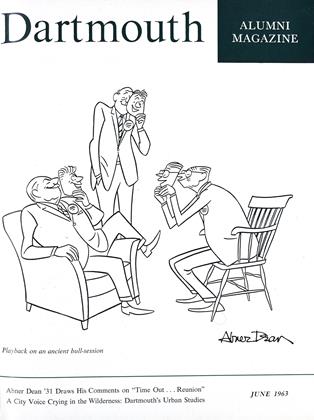By Perley Cummings Grant '01. NewYork: Vantage Press, 1962. 142 pp. $3.00.
This vivid account of the efforts of a gifted young Protestant minister in rebuilding a decaying downtown church in a large city, against hostility and evil, should be of interest to anyone concerned with the problems of the Christian Church in modern America. The places, persons and denominations mentioned are not identified by name, but the stage-setting could be New England, Illinois or California. The time is the" last' decade of the 19th century, when "modernism" (scientific study of the Bible Higher Criticism, liberal theology, etc.) began to lock horns with the time-honored "fundamentalism" - a mighty battle in which for a full generation our President Tucker took a prominent place, both as a renowned churchman and educator. The basic theme of the book, perhaps, is the power-struggle between a hard-core standpat minority, with its seniority rights and hoary traditions, against a much younger majority demanding change, growth, and spiritual challenge - a situation far from uncommon even at the present time.
The story, which could be called a small novel, is intensely personal throughout, with fine character delineation, lively dialogue, scenes full of dramatic surprise and suspense. The central figure, the recently widowed pastor of Calvary Church, is most appealing: small of stature, radiant and dignified in appearance, witty, eloquent, gentle, loving, selfless, patient, imaginative, courageous, with a growing following of all sorts of people who respond vitally to his dynamic and prophetic leadership. The arch-enemy is a suave, influential bank president, with tails and top hat and cane, with a small coterie of fawning sycophants, who has run the great church into the ground by his tyranny, denying any participation in its management on the part of the people. The picture is sometimes so overdrawn that the GOOD PEOPLE are seen as near-saints and the BAD PEOPLE become so Satanic that they really belong in jail, where, indeed, some actually end. Out of it all comes real generation for the evil ones, and goodness triumphs, as it should.
Dr. Grant merits a resounding Kudo. There are few indeed who dare to publish a good book when they are up in their eighties. The author of this little book knows whereof he speaks, out of personal experience, for he has had a notable career as pastor and teacher, and for over sixty years. As he has helped so many people into a fuller life over the decades, his book should be an inspiration to many more who have never heard his voice.
 View Full Issue
View Full Issue
More From This Issue
-
 Feature
FeatureAs the Century Turned
June 1963 By Edward Connery Lathem '51 -
 Feature
FeatureA CITY VOICE CRYING IN THE WILDERNESS
June 1963 By H. WENTWORTH ELDREDGE '31 -
 Feature
FeatureNine of Dartmouth's Distinguished Professors Retire on June 30
June 1963 -
 Feature
FeatureTIME OUT ... REUNION
June 1963 By Abnez Dean -
 Class Notes
Class Notes1931
June 1963 By WILLARD C. WOLFF, WILLIAM T. WENDELL -
 Books
BooksLew Stilwell: A Fine Teacher
June 1963 By JAMES L. MONTAGUE '28
Roy B. CHAMBERLIN
-
 Books
BooksFROM WHENCE COMETH MY HELP
March 1940 By Roy B. Chamberlin -
 Books
BooksMAN OF GOD
November 1941 By Roy B. Chamberlin -
 Books
BooksGREAT COMPANIONS,
April 1942 By Roy B. Chamberlin -
 Books
BooksTHINK ON THESE THINGS,
May 1942 By Roy B. Chamberlin -
 Books
BooksEARLY ENGLISH CHURCHES IN AMERICA
November 1952 By ROY B. CHAMBERLIN -
 Books
BooksSTRANGERS NO LONGER.
JULY 1963 By ROY B. CHAMBERLIN
Books
-
 Books
BooksThe November number of the Intercollegiate
JANUARY, 1928 -
 Books
BooksA History of the Development
January 1935 -
 Books
BooksBriefly Noted
NOVEMBER 1966 -
 Books
BooksLEG MAN
April 1943 By Herbert F. West '22 -
 Books
BooksIdiocy and Fantasy
JAN./FEB. 1979 By J. D. O'HARA '53 -
 Books
BooksTRADEMARK PROBLEMS AND HOW TO AVOID THEM.
JULY 1973 By KENNETH R. DAVIS


